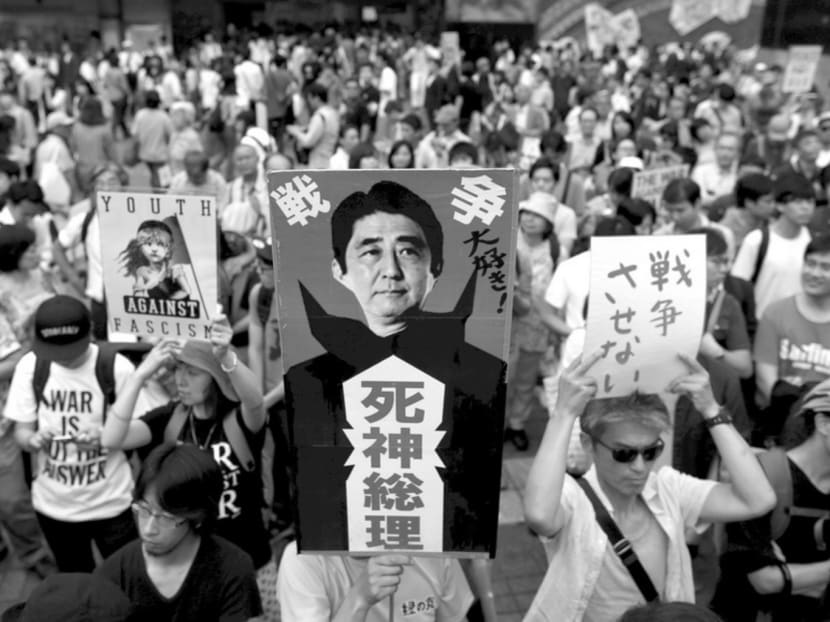Quest to revise pacifist Constitution could cost Abe politically
Summer in Japan. First the air turns damp, then the rain pours, before June gives way to the sweaty heat of July and all of those with riches or power flee Tokyo for the beach or the cool of a mountain resort.

Hundreds of protesters joined a demonstration in Shibuya on Saturday against Mr Abe’s policies. Only 29 per cent of the public support the security Bills; 53 per cent oppose them. The centre placard reads in Japanese ‘Love the war’ (top) and ‘Reaper Prime Minister’ (bottom). Photo: Reuters
Summer in Japan. First the air turns damp, then the rain pours, before June gives way to the sweaty heat of July and all of those with riches or power flee Tokyo for the beach or the cool of a mountain resort.
But not this year — at least not for Japan’s politicians. They will be trapped in the capital for a long, hot summer, trying to pass a security reform Bill dear to Mr Shinzo Abe’s heart. The passage of the Bill threatens to turn the summer into a season of torment for the Japanese Prime Minister.
For the first time since sweeping to power in 2012 on his three-arrowed programme of economic reform, Mr Abe is devoting a large chunk of political energy and capital to his main personal priority: The quest to revise Japan’s pacifist settlement after World War II.
The early signs suggest it is causing Mr Abe significant political damage. His popularity has slid to a record low of 39 per cent as he concentrates on an issue that is neither popular nor a priority for the Japanese public. The more political capital Mr Abe spends on security, the less he has for crucial economic reforms.
The current session of Japan’s Diet has been extended by an unprecedented 95 days until the end of September.
Mr Abe’s goal is to pass laws to reinterpret Japan’s pacifist Constitution, allowing it to exercise “collective” self-defence. That would let Japan come to the military aid of an ally such as the United States, instead of merely defending itself.
Only 29 per cent of the public supports the security Bills; 53 per cent opposes them. However, for the nationalist Mr Abe, changing these laws is central to his purpose in politics, as well as being a personal commitment to the US.
WILL PUBLIC PRESSURE MOUNT?
Not only are the security laws unpopular, but their passage seems certain to sap Mr Abe’s political strength. To start with, they are enormously complicated, coming in two separate Bills and revising 10 existing laws. That means the opposition can demand endless “explanation” and scrutiny, dragging out the debate.
There is also a high risk that the Constitution is not as malleable as Mr Abe would like, and his reinterpretation will violate it. The legal arguments are abstruse, but the perception is what matters politically.
In one notable fiasco, Mr Abe’s Liberal Democratic Party (LDP) invited a law professor to testify in Parliament, only to have him declare that their Bill is unconstitutional.
All of this gives Mr Abe’s ragtag political opponents, as well as his beaten-down foes in the media, a flag to rally around. They have found it impossible to fight Mr Abe’s economic message of hope and national revival; an unpopular security law, portrayed as opening the door to involvement in American wars, is another matter.
Mr Abe and his allies always knew this summer would be bad. Their plan is to take the political pain now, against the backdrop of a rising stock market, and give themselves time to recover before Upper House elections next year. Nor are the opposition likely to beat Mr Abe on the security law this summer. “Considering the very long extension to the Diet session, its passage will be very hard to prevent,” said one senior opposition politician. “The only way to stop it would be public pressure.”
But the opposition do not need to defeat Mr Abe now. They merely need to hurt him, sully his aura of competence and halt his momentum.
The office of Prime Minister is not strong in Japan — there is a reason the country was notorious for a parade of short-lived Premiers before Mr Abe came to power. And neither is Mr Abe deeply loved, by either his public or his party.
The public respect him for the stability and economic progress he has brought; the LDP back him because he is a winner, who has secured them a crushing parliamentary majority.
That economic programme, and the lack of any viable alternative to it, remains an enormous political strength for the Prime Minister. But the next few months pose a serious threat to Mr Abe and the programme of reforms investors are relying on.
Deny hundreds of politicians a holiday, lock them in a steaming city to debate an unpopular policy, and all kinds of mischief can result.
ABOUT THE AUTHOR:
Robin Harding is the Tokyo bureau chief for The Financial Times.






